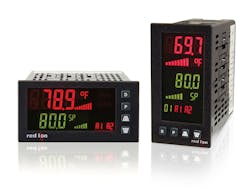Red Lion Controls, the global experts in communication, monitoring and control for industrial automation and networking, announced the integration of FlexBus technology to its PAX2C proportional-integral-derivative (PID) controller portfolio.
By inserting field installable FlexCard modules, users can now populate PAX2C PID controllers in more than 150 configurations to monitor and control multiple application processes on a single display.
Red Lion’s advanced PAX2C modular platform provides an easy upgrade path that enables integrators and panel builders to reduce inventory requirements while increasing application support. The solution is ideal for temperature, flow and pressure control in industries such as packaging, plastic welding, extrusion and food and beverage.
“Our PAX2C controllers are designed for end users who want to address a wide range of PID control requirements,” said Jeff Thornton, director of product management at Red Lion Controls. “By using option cards with the PAX2C, organizations no longer have to maintain an inventory of application-specific controllers. This reduces inventory costs while also allowing organizations to more quickly meet any PID application requirements.”
The new FlexCard modules include:
- Process Input/Remote Setpoint Cards: support input of 0/4 to 20 mA to enable cascade control loops where tighter control is required
- Heater Current Monitor Cards: provide heater current input and can signal when the heater or heater control devices have failed before damage occurs
Red Lion’s Crimson programmed PAX2C PID controllers are dual-line displays that change color based on process status, alerting when a value is out of a specified range. With universal process inputs and AC/DC power input, PAX2C controllers accept DC current, DC voltages, process signals, thermocouples and RTD inputs to provide an all-in-one platform that eases integration. Additional features include a large LCD display with easy-to-read bar graphs, programmable annunciators, up to 16 alarms and a built-in USB programming port.
>> For more information, click here
